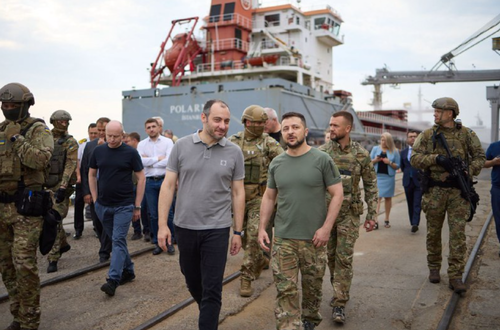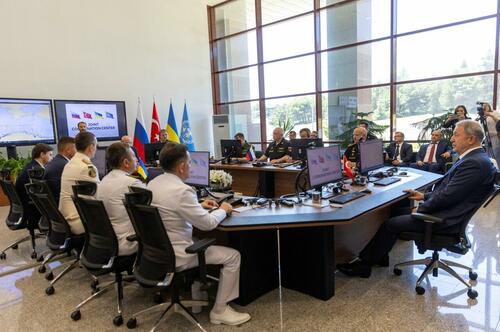
Ukraine has announced that the first ship loaded with Ukrainian grain is set to depart a southern port under Turkish auspices since the war's start.
"The first vessel, the first ship is being loaded since the beginning of the war. This is a Turkish vessel," Zelensky said while visiting the Chornomorsk port, where a ship named Polarnet is set to depart - being the first to do so under the UN-brokered Russia-Ukraine deal to open up the country's ports.

Kiev has long charged Russian forces with militarily blocking its ports while also stealing Ukrainian grain, also as Washington has accused Moscow of choking off global food supply.
Zelensky cited that several ships are loaded and ready for transport under Turkish and UN protection per the prior Istanbul agreement. Ukraine had at the time of signing the July 22 deal stressed that the agreement is not directly with Russia but with the United Nations - saying it won't deal directly with Moscow.
Media estimates have commonly indicated that some 20 million tons of grain, largely from last year's harvest, have been "held hostage" and are piling up at blockaded ports.
The New York Times writes in a fresh report on the crisis, "But despite fanfare in Brussels and Washington, the accord is being greeted cautiously in the fields of Ukraine. Farmers who have lived for months under the risk of Russian missile attacks and economic uncertainty are skeptical that a deal will hold."
And more from the report:
"The opening of the Black Sea ports is not by itself the magic answer," said Georg von Nolcken, chief executive of Continental Farmers Group, a large agro-business with vast tracts around western Ukraine. "It’s definitely a step forward, but we can’t assume that the deal will bring Ukraine back to where it was” before the war," he said.
The blockage has ignited wild price swings for crops and the cost of transporting them. Storage is running out for the latest harvests, leaving many scrambling for makeshift solutions.
Zelensky, however, was optimistic in visiting Chornomorsk port Friday. "Our side is fully prepared. We sent all the signals to our partners — the UN and Turkey, and our military guarantees the security situation," he said
"The minister of infrastructure is in direct contact with the Turkish side and the UN. We are waiting for a signal from them that we can start," he added. "It is important for us that Ukraine remains the guarantor of global food security."

Days ago as part of the most significant implementation of last week's UN deal thus far, a joint coordination center was set up in Istanbul to "oversee departures from the ports of Odessa, Chernomorsk and Yuzhny, in which ships must circumvent mines, and will conduct inspections of incoming ships for weapons, Turkish media described, noting too that all vessels must traverse Turkish waters.
Ukraine has announced that the first ship loaded with Ukrainian grain is set to depart a southern port under Turkish auspices since the war’s start.
“The first vessel, the first ship is being loaded since the beginning of the war. This is a Turkish vessel,” Zelensky said while visiting the Chornomorsk port, where a ship named Polarnet is set to depart – being the first to do so under the UN-brokered Russia-Ukraine deal to open up the country’s ports.

Kiev has long charged Russian forces with militarily blocking its ports while also stealing Ukrainian grain, also as Washington has accused Moscow of choking off global food supply.
Zelensky cited that several ships are loaded and ready for transport under Turkish and UN protection per the prior Istanbul agreement. Ukraine had at the time of signing the July 22 deal stressed that the agreement is not directly with Russia but with the United Nations – saying it won’t deal directly with Moscow.
Media estimates have commonly indicated that some 20 million tons of grain, largely from last year’s harvest, have been “held hostage” and are piling up at blockaded ports.
The New York Times writes in a fresh report on the crisis, “But despite fanfare in Brussels and Washington, the accord is being greeted cautiously in the fields of Ukraine. Farmers who have lived for months under the risk of Russian missile attacks and economic uncertainty are skeptical that a deal will hold.”
And more from the report:
“The opening of the Black Sea ports is not by itself the magic answer,” said Georg von Nolcken, chief executive of Continental Farmers Group, a large agro-business with vast tracts around western Ukraine. “It’s definitely a step forward, but we can’t assume that the deal will bring Ukraine back to where it was” before the war,” he said.
The blockage has ignited wild price swings for crops and the cost of transporting them. Storage is running out for the latest harvests, leaving many scrambling for makeshift solutions.
Zelensky, however, was optimistic in visiting Chornomorsk port Friday. “Our side is fully prepared. We sent all the signals to our partners — the UN and Turkey, and our military guarantees the security situation,” he said
“The minister of infrastructure is in direct contact with the Turkish side and the UN. We are waiting for a signal from them that we can start,” he added. “It is important for us that Ukraine remains the guarantor of global food security.”

Days ago as part of the most significant implementation of last week’s UN deal thus far, a joint coordination center was set up in Istanbul to “oversee departures from the ports of Odessa, Chernomorsk and Yuzhny, in which ships must circumvent mines, and will conduct inspections of incoming ships for weapons, Turkish media described, noting too that all vessels must traverse Turkish waters.






